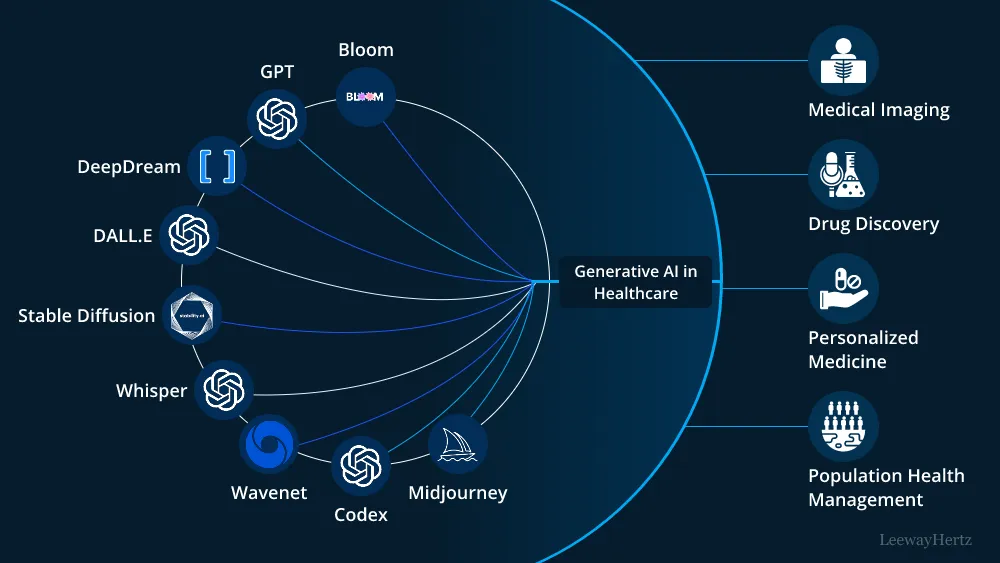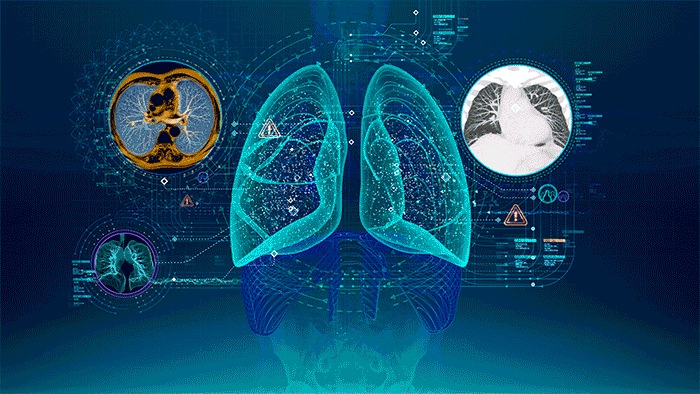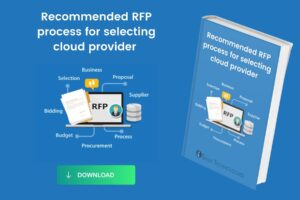In the ever-evolving landscape of healthcare, one remarkable technology is making waves and reshaping the industry as we know it: Generative Artificial Intelligence (AI).
At the nexus of innovation and patient care, Generative AI is poised to revolutionize healthcare delivery, diagnosis, and treatment. In this comprehensive exploration, we delve into the profound impact of Generative AI in healthcare, unraveling its potential to transform patient care and usher in a new era of medical excellence.

Understanding Generative AI
Before we dive into its applications in healthcare, let’s grasp the essence of Generative AI. At its core, Generative AI is a subset of artificial intelligence that focuses on the creation of data, whether it be text, images, or even music, that closely resembles human-generated content. This revolutionary technology operates on the principles of deep learning and neural networks, enabling machines to generate content that is not only coherent but also contextually relevant.
The Power of Generative AI in Healthcare

Enhanced Diagnostic Accuracy
One of the most groundbreaking applications of Generative AI in healthcare lies in its ability to enhance diagnostic accuracy. Imagine a world where medical professionals are aided by AI algorithms that can analyze complex medical data with unprecedented precision. Generative AI can swiftly process vast amounts of patient information, assisting doctors in making faster and more accurate diagnoses. This translates into quicker interventions and ultimately saves lives.
No two patients are alike, and Generative AI recognizes this fact. By analyzing a patient’s medical history, genetic makeup, and current condition, AI can generate personalized treatment plans. These plans consider individual variations and preferences, optimizing the chances of successful outcomes. Gone are the days of one-size-fits-all medicine; Generative AI tailors treatments to the unique needs of each patient.
Drug Discovery Acceleration
Drug discovery is an arduous and time-consuming process. However, with Generative AI, researchers can significantly expedite the development of new medications. AI algorithms can analyze vast datasets to identify potential drug candidates, predict their effectiveness, and even suggest modifications for enhanced efficacy. This acceleration of drug discovery has the potential to combat diseases more effectively and bring life-changing medications to market sooner.
Efficient Resource Allocation
Hospitals and healthcare systems often face the challenge of resource allocation. Generative AI can optimize this process by analyzing patient admission data, predicting patient inflow, and assisting in the efficient allocation of staff and resources. This not only reduces wait times for patients but also improves overall hospital management.
Telemedicine and Remote Monitoring
In an era where telemedicine and remote patient monitoring have become essential, Generative AI plays a pivotal role. AI-driven chatbots and virtual healthcare assistants can provide immediate support and information to patients, reducing the burden on healthcare providers. Additionally, remote monitoring devices equipped with AI can detect early warning signs of health issues, allowing for timely interventions and reducing hospital readmissions.
The Road Ahead: Challenges and Opportunities
Data Quality and Bias
While Generative AI holds immense promise, it heavily relies on data. Ensuring the quality and diversity of healthcare data is crucial. Biased data can lead to biased outcomes, which can have serious consequences in medical applications. The challenge lies in collecting and curating data that represents diverse demographics and health conditions to ensure fair and accurate AI-generated insights.
Regulatory Compliance
As Generative AI becomes more integrated into healthcare, regulatory bodies like the FDA are working to establish guidelines and standards. Compliance with these regulations is essential to ensure patient safety and data security. Healthcare organizations must navigate this evolving landscape and adapt their practices accordingly.
Interoperability
Healthcare systems often use a variety of software and hardware solutions that may not seamlessly integrate with Generative AI technologies. Ensuring that AI systems can communicate and work effectively within existing healthcare infrastructure is a technical challenge that needs to be addressed for widespread adoption.
Patient Acceptance
Acceptance of AI-generated recommendations by both patients and healthcare professionals is vital. Patients may be hesitant to trust AI with their healthcare decisions, fearing a lack of human empathy. Therefore, educating patients and healthcare providers about the benefits and limitations of Generative AI is crucial for its acceptance.
Continuous Learning and Improvement
Generative AI systems need to constantly evolve and improve. This requires ongoing training with new data and feedback loops to correct errors and biases. Healthcare organizations must invest in the infrastructure and expertise required for the continuous improvement of AI algorithms.
The Collaborative Future
To harness the full potential of Generative AI in healthcare, collaboration is key. It’s not just about AI replacing human expertise; it’s about AI augmenting human capabilities. Healthcare professionals and AI systems can work together synergistically to provide the best possible care.
Medical professionals can use AI as a powerful decision support tool. AI can analyze patient data, suggest treatment options, and predict outcomes. This allows healthcare providers to make more informed decisions and provide personalized care plans. Moreover, AI can handle repetitive administrative tasks, freeing up healthcare workers to focus on patient interactions and complex cases.
The Promise of Early Detection and Prevention
Generative AI excels at identifying patterns in data. This capability can be harnessed for early disease detection and prevention. AI can analyze an individual’s health data over time, detecting subtle changes that may indicate the onset of a medical condition. By catching diseases at their earliest stages, treatment can be more effective, and outcomes improved.
Bridging Healthcare Disparities
Generative AI has the potential to bridge healthcare disparities. By providing personalized, accessible healthcare solutions, AI can ensure that quality care is available to all, regardless of geographic location or socioeconomic status. Telemedicine, enabled by AI, can bring specialist consultations to remote areas, reducing healthcare inequalities.
The Ethical Considerations
While the potential of Generative AI in healthcare is awe-inspiring, it’s crucial to address the ethical considerations that come with it. Patient privacy, data security, and transparency in AI algorithms are paramount. Striking a balance between innovation and ethical practice is imperative to ensure that Generative AI benefits all, without compromising patient rights.
Conclusion
In conclusion, Generative AI in healthcare is not just a technological leap; it’s a quantum leap. It’s a leap towards more accurate diagnoses, personalized treatments, accelerated drug discovery, efficient resource allocation, and accessible telemedicine. As the healthcare industry continues to embrace Generative AI, we stand on the cusp of a healthcare revolution that prioritizes patient care like never before.
As we move forward, it’s essential to remember that while technology can transform the landscape, the heart of healthcare remains human. Generative AI is a powerful tool in the hands of medical professionals, but the compassion, expertise, and dedication of healthcare providers will always be at the core of patient





